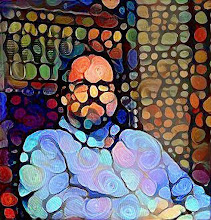Okay all you teachers... there was an editorial in Friday's USAToday about the (poor) reading habits of today's teens, the dearth of quality textbooks, and how many teachers are using these lousy textbooks as a crutch for their own teaching. You can read the article yourself by clicking here.
Do you teachers out there agree with the article? How do you get around the issue of over-sized but under underwhelming textbooks?
Many of you that I know who might be reading this are English teachers. What do you think is the biggest reading-killer among high school students? How do you think that interest can be brought back? Surely we can't make every student an avid reader, just as we can't make every student a top-notch athlete. But how do you develop good reading habits among kids who are living in a nano-second world -- everything has to happen immediately?
Tuesday, August 09, 2005
Subscribe to:
Post Comments (Atom)


3 comments:
How to develop good reading habits among kids? Simple: find stuff that interests them. Okay, that's not so simple, but it's a start. Part of the problem that I see, and is evident in the article cited, is the idea of "textbook." I've seen many teachers/classes which rely heavily (no pun intended) on these huge anthology books. I use one in my English 12 class, but I've been using it less and less each year. (Part of the problem is funding -- can I buy new books if I want to? Usually the answer is "no.") One thing that I do is bring in stuff of my own, make copies, and/or read to kids out of it. (Even high school seniors will enjoy being read to.) I have a collection of books I've purchases over the last four+ years in my room that kids can choose from (they have to read a book on their own outside of what we do in class). I've added to my curriculum (when I can) from stuff I own and like. The enthusiasm I hold for certain books rubs off -- not on all kids, obviously, but on some.
Let me quote a paragraph from the USAToday article:
"One of the most popular books I teach is Night, Elie Wiesel's powerful remembrance about Nazi concentration camps. Even the most reluctant readers are enthralled by the 109-page narrative. The Holt, Rinehart and Winston World Literature text throws in seven pages of Night, cheating students out of the experience of reading the whole work and giving them the illusion that they know the book."
This is something I'd be reluctant to do, but all of us are "forced" to do it at some time or other. (And, actually, I teach Night in a different class.) We read some of Beowulf in my Senior English class -- excerpts from it are in our oversized textbook. Now if you've read Beowulf, you know you wouldn't want to read all of it in a 12th grade English class, but what I do is tell them what's missing from their textbook, and in one instance, I read several pages (a newer translation than the one in our book) of a portion that's missing that I think they'd enjoy.
And let's not even discuss using USAToday (or McPaper, as it's often referred to) as a legitimate source.
Bill, Bill, Bill, where have you gone wrong? Just kidding. A lot of your points are valid, and I agree with them.
I have described movies as "the literature of the 20th century." We are all used to a more visual stimulation and way of storytelling than a merely printed one. Beyond the film class that I teach, I use movies as a way to supplement and complement some of the literature I teach. I don't just show the movie, but we talk about the differences between the movie and the book, and maybe the reasons for that. And there is definitely an element of our school where we try to teach kids how they are being "manipulated" by the media.
Is it important to teach kids to read? Yeah, probably more than ever. Consider one example of how much kids rely on the internet to get their information nowadays. That's a type of reading skill they need. Do they need to be able to read and analyze a novel? (Bear in mind that I teach that very thing.) I say yes, if they want to be an intelligent, well-rounded individual. As a survival skill? Sadly, no.
And I think cursive writing has become archaic -- though that's not necessarily a bad thing. The foreign exchange students I get generally don't know how to write cursive. I'm not sure if that's an English language skill they lack, of if many European languages don't use cursive either. I've tried to explore that question, but haven't found a definitive answer.
So...you get a phenomenon like Harry Potter tossed in to your lap... you've suddenly got kids reading who've probably not cracked a book before. How do you capitalize on it?!
Of course the publishers, in their lack of imagination, try to pump out carbon copies (I can list some of them for you if you'd like). But let's face it...kids are smarter than that. They don't want a copy...they want something unique but equally exciting. I've written articles about this, but I wonder what a teacher would do. How do you take advantage of this great opportunity?
And while I don't care to throw myself in to the best-seller list for my reading material too often, it is good that there is something that people are reading enmasse. Reading The daVinci Code is better than not reading (or better than playing with the Xbox).
Post a Comment